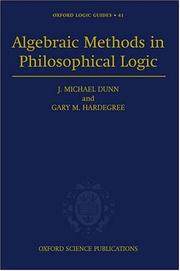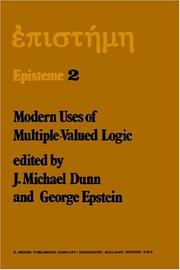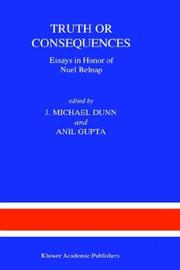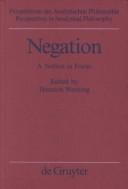| Listing 1 - 10 of 10 |
Sort by
|

ISBN: 0198531923 9780198531920 Year: 2001 Publisher: Oxford Clarendon
Abstract | Keywords | Export | Availability | Bookmark
 Loading...
Loading...Choose an application
- Reference Manager
- EndNote
- RefWorks (Direct export to RefWorks)
This comprehensive text demonstrates how various notions of logic can be viewed as notions of universal algebra. It is aimed primarily for logisticians in mathematics, philosophy, computer science and linguistics with an interest in algebraic logic, but is also accessible to those from a non-logistics background. It is suitable for researchers, graduates and advanced undergraduates who have an introductory knowledge of algebraic logic providing more advanced concepts, as well as more theoretical aspects. The main theme is that standard algebraic results (representations) translate into standard logical results (completeness). Other themes involve identification of a class of algebras appropriate for classical and non-classical logic studies, including: gaggles, distributoids, partial- gaggles, and tonoids. An imporatant sub title is that logic is fundamentally information based, with its main elements being propositions, that can be understood as sets of information states. Logics are considered in various senses e.g. systems of theorems, consequence relations and, symmetric consequence relations.
Algebraic logic --- Logic, Symbolic and mathematical --- Algebraic logic.
Book
ISBN: 1848903189 9781848903180 Year: 2019 Publisher: London: College Publications,
Abstract | Keywords | Export | Availability | Bookmark
 Loading...
Loading...Choose an application
- Reference Manager
- EndNote
- RefWorks (Direct export to RefWorks)
J. Michael Dunn's PhD dissertation occupies a unique place in the development of the algebraic approach to logic. In The Algebra of Intensional Logics, Dunn introduced De Morgan monoids, a class of algebras in which the algebra of R (the logic of relevant implication) is free. This is an example where a logic's algebra is neither a Boolean algebra with further operations, nor a residuated distributive lattice. De Morgan monoids served as a paradigm example for the algebraization of other relevance logics, including E, the logic of entailment and R-Mingle (RM), the extension of R with the mingle axiom.De Morgan monoids extend De Morgan lattices, which algebraize the logic of first-degree entailments that is a common fragment of R and E. Dunn studied the role of the four-element De Morgan algebra D in the representation of De Morgan lattices, and from this he derived a completeness theorem for first-degree entailments. He also showed that every De Morgan lattice can be embedded into a 2-product of Boolean algebras, and proved related results about De Morgan lattices in which negation has no fixed point. Dunn also developed an informal interpretation for first-degree entailments utilizing the notion of aboutness, which was motivated by the representation of De Morgan lattices by sets.Dunn made preeminent contributions to several areas of relevance logic in his career spanning more than half a century. In proof theory, he developed sequent calculuses for positive relevance logics and a tableaux system for first-degree entailments; in semantics, he developed a binary relational semantics for the logic RM. The use of algebras remained a central theme in Dunn's work from the proof of the admissibility of the rule called γ to his theory of generalized Galois logics (or ``gaggles''), in which the residuals of arbitrary operations are considered. The representation of gaggles---utilizing relational structures---gave a new framework for relational semantics for relevance and for so-called substructural logics, and led to an information-based interpretation of them.
Book
Abstract | Keywords | Export | Availability | Bookmark
 Loading...
Loading...Choose an application
- Reference Manager
- EndNote
- RefWorks (Direct export to RefWorks)

ISBN: 9027707472 940101163X 9401011613 9789027707475 Year: 1977 Volume: 2 Publisher: Dordrecht Reidel
Abstract | Keywords | Export | Availability | Bookmark
 Loading...
Loading...Choose an application
- Reference Manager
- EndNote
- RefWorks (Direct export to RefWorks)
Mathematical logic --- Many-valued logic --- Congresses. --- -Logic, Many-valued --- Logic, Multivalued --- Logic, Variable-valued --- Multivalued logic --- Variable-valued logic --- Nonclassical mathematical logic --- Values --- Congresses --- -Congresses --- Logic, Many-valued --- Many-valued logic - Congresses.
Book
ISBN: 0691073392 0691071926 9780691071923 9780691073392 Year: 1975 Publisher: Princeton (N.J.) Princeton university press
Abstract | Keywords | Export | Availability | Bookmark
 Loading...
Loading...Choose an application
- Reference Manager
- EndNote
- RefWorks (Direct export to RefWorks)
Entailment (Logic) --- Entailment (Logic). --- 510.6 --- 510.6 Mathematical logic --- Mathematical logic --- Logic --- Logic, symbolic and mathematical --- Logique mathématique

ISBN: 9780792309208 0792309200 9401067910 9400906811 Year: 1990 Publisher: Dordrecht Kluwer
Abstract | Keywords | Export | Availability | Bookmark
 Loading...
Loading...Choose an application
- Reference Manager
- EndNote
- RefWorks (Direct export to RefWorks)
The essays in this collection are written by students, colleagues, and friends of Nuel Belnap to honor him on his sixtieth birthday. Our original plan was to include pieces from fonner students only, but we have deviated from this ever so slightly for a variety of personal and practical reasons. Belnap's research accomplishments are numerous and well known: He has founded (together with Alan Ross Anderson) a whole branch of logic known as "relevance logic." He has made contributions of fundamental importance to the logic of questions. His work in modal logic, fonnal pragmatics, and the theory of truth has been highly influential. And the list goes on. Belnap's accomplishments as a teacher are also distinguished and well known but, by virtue of the essential privacy of the teaching relationship, not so well understood. We would like to reflect a little on what makes him such an outstanding teacher.
Logic --- Mathematics --- Probabilities --- Truth --- Linguistics --- Philosophy --- Probabiliteit--Theorie --- Probabiliteitstheorie --- Probabilité [Théorie de la ] --- Waarschijnlijkheid--Theorie --- Waarschijnlijkheidstheorie --- Logic. --- Probabilities. --- Truth. --- Philosophy. --- Conviction --- Probability --- Statistical inference --- Argumentation --- Deduction (Logic) --- Deductive logic --- Dialectic (Logic) --- Logic, Deductive --- Logic of mathematics --- Mathematics, Logic of --- Belnap, Nuel D., --- Belief and doubt --- Skepticism --- Certainty --- Necessity (Philosophy) --- Pragmatism --- Combinations --- Chance --- Least squares --- Mathematical statistics --- Risk --- Intellect --- Psychology --- Science --- Reasoning --- Thought and thinking --- Methodology --- Mathematics - Philosophy --- Linguistics - Philosophy --- Belnap, Nuel D., - 1930 --- -Logic --- -Logic.
Book
ISBN: 0691654646 0691600422 Year: 2017 Publisher: Princeton, New Jersey : Princeton University Press,
Abstract | Keywords | Export | Availability | Bookmark
 Loading...
Loading...Choose an application
- Reference Manager
- EndNote
- RefWorks (Direct export to RefWorks)
In spite of a powerful tradition, more than two thousand years old, that in a valid argument the premises must be relevant to the conclusion, twentieth-century logicians neglected the concept of relevance until the publication of Volume I of this monumental work. Since that time relevance logic has achieved an important place in the field of philosophy: Volume II of Entailment brings to a conclusion a powerful and authoritative presentation of the subject by most of the top people working in the area. Originally the aim of Volume II was simply to cover certain topics not treated in the first volume--quantification, for example--or to extend the coverage of certain topics, such as semantics. However, because of the technical progress that has occurred since the publication of the first volume, Volume II now includes other material. The book contains the work of Alasdair Urquhart, who has shown that the principal sentential systems of relevance logic are undecidable, and of Kit Fine, who has demonstrated that, although the first-order systems are incomplete with respect to the conjectured constant domain semantics, they are still complete with respect to a semantics based on "arbitrary objects." Also presented is important work by the other contributing authors, who are Daniel Cohen, Steven Giambrone, Dorothy L. Grover, Anil Gupta, Glen Helman, Errol P. Martin, Michael A. McRobbie, and Stuart Shapiro. Robert G. Wolf's bibliography of 3000 items is a valuable addition to the volume.Originally published in 1992.The Princeton Legacy Library uses the latest print-on-demand technology to again make available previously out-of-print books from the distinguished backlist of Princeton University Press. These editions preserve the original texts of these important books while presenting them in durable paperback and hardcover editions. The goal of the Princeton Legacy Library is to vastly increase access to the rich scholarly heritage found in the thousands of books published by Princeton University Press since its founding in 1905.
Book
ISBN: 9781400887071 Year: 2017 Publisher: Princeton, NJ
Abstract | Keywords | Export | Availability | Bookmark
 Loading...
Loading...Choose an application
- Reference Manager
- EndNote
- RefWorks (Direct export to RefWorks)
Digital
ISBN: 9781400887071 Year: 2017 Publisher: Princeton, N.J. Princeton University Press
Abstract | Keywords | Export | Availability | Bookmark
 Loading...
Loading...Choose an application
- Reference Manager
- EndNote
- RefWorks (Direct export to RefWorks)


ISBN: 9783110876802 9783110147698 Year: 2010 Publisher: Berlin ;; Boston De Gruyter
Abstract | Keywords | Export | Availability | Bookmark
 Loading...
Loading...Choose an application
- Reference Manager
- EndNote
- RefWorks (Direct export to RefWorks)
| Listing 1 - 10 of 10 |
Sort by
|

 Search
Search Feedback
Feedback About UniCat
About UniCat  Help
Help News
News